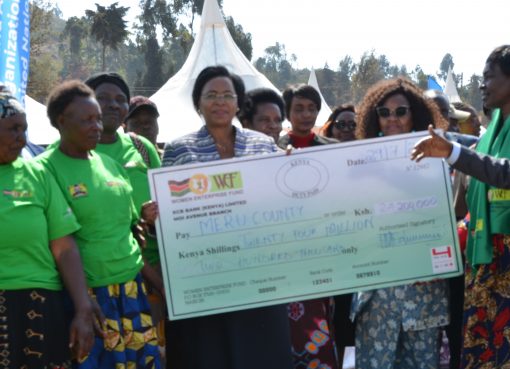The Government projects to put up 1,000,000 Affordable Housing Units in five years’ time and this is on course with over 700,000 units already under construction.
The housing programme spearheaded by the government is not only meant to provide decent living but also create job opportunities.
The Government Spokesperson Isaac Mwaura who spoke in Kirinyaga County, said14 housing projects are ongoing in the Central region covering 5 counties, all at various stages of completion.
The projects comprise 7,628 affordable housing units, employing an average of 2,130 daily workers on site, with an additional 5,000 skilled and low-skilled workers engaged directly and indirectly off-site across the housing economic value chain in the region.
Kiambu county has six projects with 5599 units, Nyandarua three projects with 960 units, Nyeri two projects with 859 units, Kirinyaga two with 220 units and Murang’a has one project with 220 units.
Dr. Mwaura added that the State Department for Housing and Urban Development and the National Housing Corporation (NHC) has ring-fenced Sh 1.135 billion for the Jua Kali and Micro Small and Medium Enterprises (MSMEs)in the region to produce steel doors, steel windows, wooden doors, joinery and balustrades, as well as landscaping on-site in these 14 projects.
The projects have created employment opportunities for both skilled and unskilled labour.
The spokesperson, who toured various development projects in Kirinyaga, added that the government is committed to ensuring universal access to water to improve the quality of life for all citizens, through infrastructure development and capacity building at the county level. He noted from 2022 over 5 million additional people have been provided with guaranteed access to clean and safe water across the country.
Additionally, the government has increased connections to sanitation and sewerage services from 27 percent in 2022 to 33 percent in 2024, benefiting more than 280,000 households. The number of connections is expected to rise to 35 percent in the next nine months, translating to an additional 100,000 people gaining access to safely managed sanitation.
In regard to Cooperatives and the Micro, Small and Medium Enterprises (MSMEs) development, the Mwaura acknowledged that the government, through provision of enabling policy and regulatory frameworks as envisioned by the Bottom-Up Transformation Agenda, is committed to promoting growth and development of co-operatives.
This is through semi-autonomous government agencies including the New Kenya Co-operative Creameries (N-KCC) whose mandate is to procure high quality raw milk, process, package and market it alongside its value-added products. This is alongside the New Kenya Planters Co-operative Union (N-KPCU) to provide affordable credit to coffee farmers, mill and market their coffee.
“In the last two years the government has attained a number of achievements in the cooperative sub-sector key among them; registration of 389 co-operative societies across the 9 priority value chains which can be broken into; three cooperatives for Rice, one in the Tea sector, 22 in Livestock and Beef, 62 in the Dairy production, 41 in Edible Oils, 117 in the Artisanal Miners, 104 for the Blue Economy and Artisanal Fishing, 17 in the Textiles and Apparel and 22 Construction/Affordable Housing Cooperative Societies, “explained Dr Mwaura.
The revamped N-KCC is currently serving 60,000 dairy farmers through 300 dairy cooperatives, majorly from the Central Region. The government has allocated more funds in the current Financial Year 2024/25 for milk powder processing and completion of the last phase of the N-KCC modernization project.
The N-KPCU has in the last two years disbursed credit totaling Sh 4.95 billion to 365,872 coffee farmers spread across the 26 coffee growing counties through the Coffee Cherry Advance Revolving Fund.
The Coffee Cherry Fund was established to provide affordable, sustainable and accessible cherry advance to smallholder coffee farmers. . A small holder coffee estate or small holder coffee grower is eligible to benefit from the fund if one is a Kenyan citizen, member of a registered coffee cooperative society or affiliated to the N-KPCU and needs to just have an identity card, or passport and a membership card of the N-KPCU.
“The government is committed to continuing the mobilization of individuals into cooperatives to ensure the stability of the sub-sector. This effort has been supported by the fact that the Sacco Societies Regulatory Authority’s (SASRA) supervision has achieved a core capital to assets ratio of 17.67 percent for deposit-taking SACCOs during the period, which is well above the required 10 percent. This indicates the sub-sector’s stability.” He stated.
The spokesperson together with National Government Administration Officers (NGAOs) and County Government officials held a town hall meeting at Kirinyaga CDF Hall where they engaged the public on development matters.
By Mutai Kipngetich





